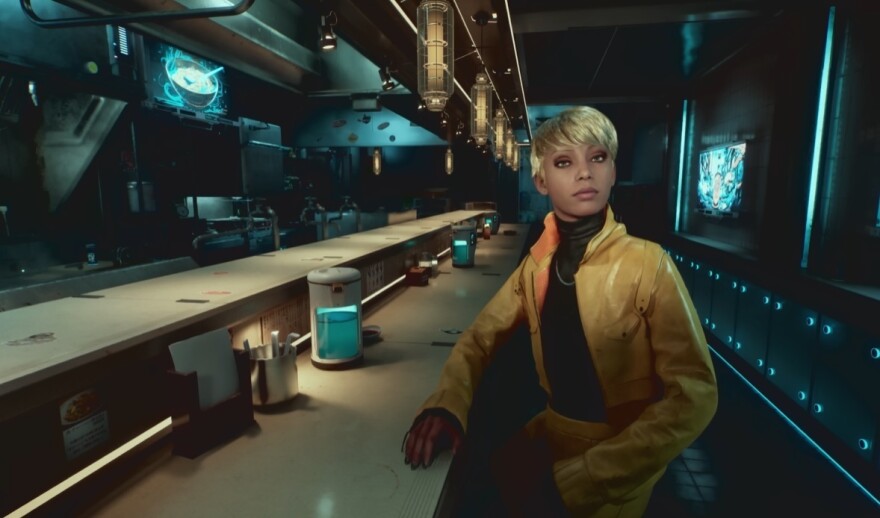Is the future of artificial intelligence in video games playing out in a cyberpunk ramen bar? Tech companies would like you to think so, but game writers aren't so sure.
In a recent demo from the tech company Nvidia, a human player talked to two video game characters using a microphone — and the characters responded in real time using generative AI.
In a press release, Nvidia said the technology offered the chance to turn "generic non-playable characters (NPCs)" into "dynamic, interactive characters capable of striking up a conversation, or providing game knowledge to aid players in their quests."
Nvidia had partnered with the tech start-up Convai for the demo, but they aren't the only ones pushing the new technology. At this year's Game Developers Conference in San Francisco on March 18-22, new video games powered by generative AI technology are expected to be announced.
And the companies at the forefront of AI are not just promising to do the work that human writers are already doing; they are promising to completely change the way video game stories are told.
It's a claim that, across the industry, is being met with skepticism and hesitation.
Pushing the boundaries
In truth, the change is already happening.
The tech is already being used widely in game development. In a survey of more than 3,000 developers conducted by the Game Developers Conference, nearly a third say they already use AI in their workplace. Employees in business and marketing were most likely to use it, while those in narrative were among the least likely.
But it's in storytelling that the promise and perils are being most closely watched.
Games often have hundreds of characters who, together, help build a bigger story and more immersive experience. Until now, their dialogue has always been written by humans.
Yet Kylan Gibbs, who develops AI at his company Inworld AI, says the generative technology can create a new relationship between author and creator.
"It means that every person ends up with something that — while still beheld to the story and narrative allure of the world — they're able to look at from different angles," he said.
Not everyone is so sure. Or, at least, not so willing to begin using AI in their own games.
Josh Sawyer is the studio design director at Obsidian Entertainment, which made narratively acclaimed games like Pentiment, and Fallout: New Vegas, and he isn't sold by the recent run of AI.
"A lot of the demos, I'm not going to lie, they seem impressive for a chat bot," he said, adding it was not something he would use in his games.
In a game like Fallout: New Vegas, which follows the remaining denizens of Earth living in the wake of a nuclear apocalypse, it's the smaller interactions with the world's many characters — and their carefully crafted responses — that make for a good story.
"The appeal for our players is the characters feel very specific," Sawyer said. "I'm not looking to make a lot of generic dialogue."
Xalavier Nelson Jr., who leads the independent studio Strange Scaffold, has similar concerns. He says everything in a game needs to be filtered through a layer of intent.
"When I hear about building NPCs that make for better or equivalent game experiences while being driven by AI responses, the first thing I have to ask is ... how much does that create a cohesive experience for the player?"
"Even if an NPC interacts in a million different ways ... if it doesn't add up to a wider message, you end up with what we call in games 'oatmeal' — a sludge which functionally means or performs nothing outside of a sheer amount of stuff that's put into the world."
A question of ethics
Joon Sung Park, an AI researcher at Stanford, doesn't think generative AI will take the place of human writers who come up with high-concept, compelling storylines.
Instead, he sees AI making a game's many small characters more complex, more dynamic, and more spontaneous.
"Where these agents are good at is creating believable micro-moments," he said. "But they're likely not going to be able to create individual, really fun stories."
Still, today it's human writers who craft a lot of the one-liners and small talk that side characters say in a video game. If AI does that instead, it might put some writers out of work, according to Nelson Jr.
"When we eliminate positions for juniors, that means they don't become mid level. Which means they don't become seniors. Which means they don't become the vibrant creative voices and directors of tomorrow," he said.
Despite the fact that generative AI is already being used across the industry, 87% of game developers surveyed by the Game Developers Conference say they are at least somewhat concerned with how this tech will impact the game industry.
That's why for many it's not a question of whether AI can write a good story — it's whether it should.
"Ten years from now, the AI might become so good at what it does that it's indistinguishable from the best human writers," says Eric Barone, who wrote and designed the hit game Stardew Valley entirely by himself.
"I feel like we have to turn to a spiritual element here. I want to play games by human beings, not games made by soulless machines."
It's an ethical question writers are confronting now. But players will face it soon, and they'll have to decide whether games written by artificial intelligence are the games they want to play.
Copyright 2024 NPR. To see more, visit https://www.npr.org.









